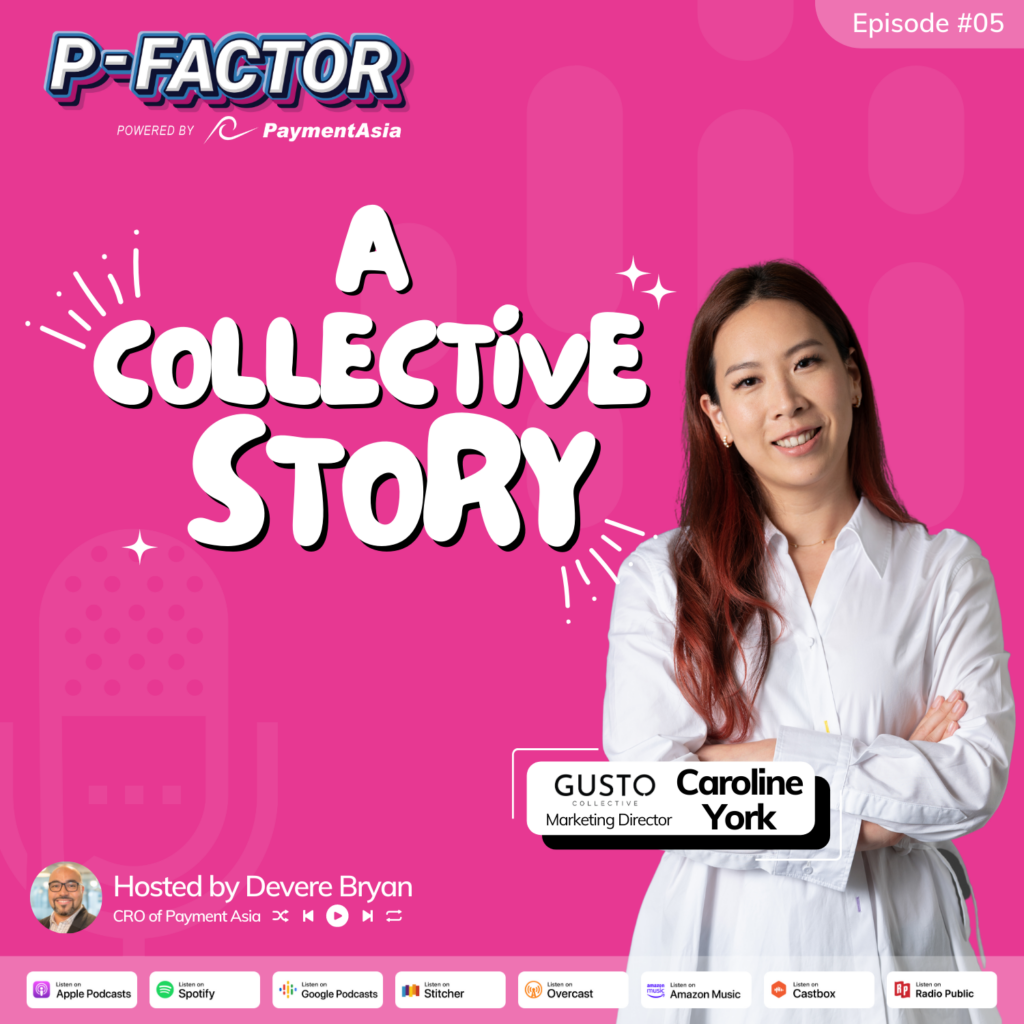Devere: Welcome to the Pay FACTOR ! See I messed up already… Welcome to the P-FACTOR. I’m here today with Caroline York from Gusto Collective. Welcome, Caroline.
Caroline: Hi, Devere. Thank you for having me today.
Devere: I’m super excited to learn more about what you’ve been doing in FinTech and in what is now known as BrandTech at Gusto Collective. So why don’t you just tell the audience who you are, what Gusto does, and I’m really interested to know, like, what is brand tech?
Caroline: Great. So while I’m the Director of Marketing at Gusto Collective, Gusto Collective is Asia’s leading brand technology group. What that means is we actually power up the storytelling narratives with the latest technologies. And these are in the realms of AR VR, immersive experiences, Metaverse, NFTs, anything to bring that story to life for the next generation.
Devere: Wow. Okay. So storytelling, storytelling through a corporate lens, or like your customers who you work with generally.
Caroline: Right. So we’re actually mostly a b2b company. So we work with some of the top global brands around, for example, I mean, we work with fashion brands that you would have heard of all the first tier-ones Alexander Wang, Vivienne Westwood. In Hong Kong, here we work with Rosewood Hong Kong, we worked with The Peninsula, we work with quite a few hospitality groups, mainly though we specialize in luxury clients. So luxury is in our DNA. We do also have other corporate clients. We have property, real estate developers as well. And we also have guys like BFI. So those are big retail groups.
Devere: So what’s your background? Did you come from a luxury background or a FinTech background?
Caroline: So actually, funnily enough, my background is more retail and fashion based. So I started out doing marketing for a fashion retail company, a German one actually called Schiesser, always sounds like something else. But in any case, I started out there and I actually progressed to doing some luxury children’s wear fashion. So think Dolce Gabbana for kids, all the really high end stuff. And when I fell into FinTech, I was, I did fall into FinTech, they were looking for someone with a bit more branding campaign experience. And that’s how I went into the role. So I was with a global advisory here in Hong Kong, for around two years before I moved to this new company Gusto Collective to do brand technology.
Devere: That’s amazing. Okay, so you’re the head of marketing for a storytelling company.
Caroline: That tells a lot of stories.
Devere: The dream job, Hong Kong, so Hong Kong is now putting ourselves in a position. I’ve been here for almost 20 years, we’ve both been around and seen lots of iterations in FinTech. Hong Kong is now at the vanguard of the virtual asset world. I’ve gone wanting to be the hub for web three and whatnot, just dialling back a tiny bit into the creative piece. There’s another area here that Hong Kong is trying to achieve, which is to be the city of culture for the next generation. Is Gusto involved in that?
Caroline: So good thing that you mentioned this so recently what we’ve done, so Art Basel came to town and Hong Kong and it was a big deal because it was the first time that Hong Kong opened up its borders since the COVID pandemic lockdowns. Now, we were approached by our really, really great partners, Rosewood Hong Kong, and they wanted to do something to celebrate. And they are the official hotel partners for Art Basel. And I remember talking to the Art Basel guys, too, and they’re like, this has to be big. You know, it’s Hong Kong has come back moment. And he’s seeing newspaper articles come through the South China Morning Post, the government’s putting a lot of emphasis behind culture behind art tech. So we were like, Let’s wrap this all together and see what Gusto can activate utilizing all of our resources, and all the newest tech available in the space. So we actually operate what are called Meta Humans, so they are virtual influencers. I think I’ve shown you this before. No, I haven’t.
Devere: I really am intrigued to understand more about what is a Meta Human.
Caroline: Right. So first of all, Meta Humans are basically not real people. They are made up of intellectual properties, kind of like Mickey Mouse, kind of like Little Mermaid, right? So their character is built, and they’re usually built in this day and age with a lot of gaming engines. So they’re very realistic. They look 3d. And obviously you insert narrative and storytelling behind them. So we operate a Meta Human called MonoC. And she is seen as the world’s first surrealist Meta Human artist. So this is an IP that can create generative art or interactive art. Right.
This is where the mind blowing moment comes. Can a fictional character create art of genuine value to be sold in the real world? The answer is yes. When she first was, we created her back in October 2021. The first collaboration she did was actually with the Philips auction house. Right. So we use her as a storytelling mechanism. And she created the artwork, which was leveraged by Philips auction house to do their storytelling. And I will tell you a little bit more about that piece separately. But because of this, she has been growing her kind of following growing her art repertoire. And she’s done work with the Hong Kong government, the LCSD. So the leisure and cultural services department. She’s done work at the Digital Art Fair last year. And so for Art Basel, she worked with Rosewood Hong Kong to create this interactive art piece, where she takes her vision of what she sees the world as, and creates these beautiful Metaverse alien looking flowers that we don’t really get here on Earth. And we put it in the lobby of the rosewood Hong Kong, it was there for around about 10 days, and people can interact with the art piece and everything was recorded. Right. So your interaction and how you can also help co create the art was all collected, and it really showcased I think, at that point, the community behind it, we were really showcasing the Hong Kong spirit, the community, the celebration, the people coming together, moving through the space, that is Rosewood and then now it’s become an NFT. So we can go into NFTs later. But it became an NFT that’s now being collected by the Rosewood Hong Kong.
Devere: Incredible. Um, it just makes me it gives me a better view of how the metaverse really is only limited by your own imagination. And I can see why she is popular…I’m already… Well, it’s interesting. Why because I have a visual idea of who she is. But I have never seen… is it MonoC? Yes, right. I’ve never seen monarch. So but in my mind, I have somebody in mind. That’s creative, and it’s making colors I’ve never seen, as you mentioned flowers I’ve never seen it and I can see why people would engage with that. It’s intriguing. And it’s one of the beautiful things, I think it’s going to come out of the innovation that’s happening through the latest iterations in web three, the broader concept of it. Where do you guys sit with regards to structuring business transactions? Like do you… Like you mentioned NFTs… Like I know you guys meant NFTs? Yeah. How does that work? How do you set that up?
Caroline: Okay, so backtrack a little, I hope everyone who’s listening maybe gets the fundamentals. So NFT is non-fungible tokens, which means they’re technically one of ones, right, you cannot replicate them in any way or form. So well, how we process these kind of NFT payments and why we even bother using NFTs, right? So our company, one of the specialties our company does through our narrative storytelling is we actually build in the world of web three through NFTs. In fact, we see NFTs and we leverage them as very unique kind of identifiers and tokens. So they have a transactional value based on an NFT. But they have also additional utility. Simply put, it’s like a membership to something. That’s what an NFT is, it’s a membership to a community. And at the same time, this membership holds value, right? It could be monetary value. And it could be other things, too. So for us when we meant these NFTs, obviously, the process is you write a smart contract. So it’s a lot of programming in the back end, right. And then you insert your normal commercial terms and conditions into the coding. Now, what’s great about NFTs that function on a blockchain is once the contract is written, and it’s codified, it can operate almost immediately and automatically. So it executes, right. So when I pass it over to you, you give me the money, it automatically transfers all the rights marks down on the blockchain that goes now this is Devere’s for your wallet number. We might not know your name, right? So that’s how we actually do these kind of transactions. All right, so we met them, and then we put it on a platform, usually, because we don’t own our own NFT marketplace. We put it on OpenSea, then there, we host it and then when somebody buys it, then it goes directly to them into their wallet and their money, Fiat or the cryptocurrencies come through to us.
Devere: There is so much more depth than I think when you know when I speak to my friends that aren’t involved at all in crypto or aren’t involved at all in Web3. They look at NFTs and just say, Well, isn’t it just an ape? Isn’t it just like when people look at profile picture. An avatar, like, why is my friend like changed his face to this ape? Right. But the value the transactional structuring, and the underpinning of that through blockchain is something I think a lot of people, you know, don’t know about, but would understand and be able to relate to through education purpose.
Caroline: Yeah, for sure. I think NFT gets a bad name, honestly speaking, because, you know, the technology was used for a lot of hot secondary market trading. Right. So the bored ape, they’re great. Essentially, when you’re buying into it, you’re buying into, yes, a unique profile picture that comes with additional benefits, you’re buying into the bored ape yacht club community, right? It’s just your access pass. But because at the time, everybody’s like, Oh, well, these profile pictures actually can be traded for more money, right? Because everybody wants them, so that they forget that there is actually real usage cases for the blockchain technology. But also, there’s real value if you buy into this community, like what can I offer you? Right? So yes, this whole, this whole like craze that happened back in 2021, really did an number on NFTs and everybody looking at NFTs from a layman perspective, or like, this is a scam. However, I would also like to clarify, if done properly, it is an incredible piece of technology that you can use, and really create individualized experiences that are well, a, they will never lie to you. It’s transparent, right? I can see all the transactions, it just imagine the kind of data information I have, that can be logged into it. Right, I can pinpoint you as a member of this community. But I can also know you also enjoy buying things from ABCDEFG. Sounds a little scary, honestly, it’s it’s like a transparent wallet with all your receipts showing. But because of this kind of data, companies can utilize it to cater better for you. Right, So all the experiences that come with it, and this is the the mind blowing part that we’re working towards. Right now, we’re working towards some proof of concepts that could use these NFTs as a membership to activate interesting exclusive events for people exclusive products, merchandise, and you’re really catering for that community.
Devere: Right. And the word community is key to this. There are two areas I see, you know, there’s lots of scope to web three, and I want to get back to the big picture stuff in a second. But the tokenization piece, being able to fractionalize those those assets is so under, like under… understood, if that makes sense, right? That I think the education piece that companies like gussto can have, or even through associations, like the FinTech Association, just help people lower the barrier to entry through fear. And those old associations with you know, scams or whatever it may be, because this is the future. Okay, so the big picture, thing I wanted to get into, and you know, we’re both members of the FinTech Association, we were recently both on a panel talking about whether or not or how Hong Kong can become a virtual asset hub. Let’s continue that conversation, because I’m excited about it. I really think that we can be here. And I think, you know, sitting in a company that focuses on payments, that’s moving through…moving our existing merchants and customers from web 2 potentially into web 3, or maybe even like for web 1.5 into web 2.5, you know, where do you see Hong Kong sitting? What’s your opinion from the customer perspective, and your own personal perspective, and maybe let’s talk about the transition that the company, the city is gonna have to go through.
Caroline: Right. So obviously, when we were on that FinTech panel, we’ve talked about the virtual asset licensing program that’s happening. And that’s really, really exciting for everyone in FinTech, honestly. Now, obviously, we are more on the fringes, right? Considering we are in the experiential branding layer, touching upon payments through NFTs. But what I see is there’s a great wave of excitement coming through.
This is saying Hong Kong is going to open up its borders and try out this new technology that everybody was kind of afraid of, because it got really bad credit for the past decade. Right? The volatility is crazy in the crypto markets. But I think this is also like a signal that…All right, we understand that there is volatility in the markets, like all trading markets, there will be risks. But now the government stepping in and saying like, Okay, we see it, we also see the potential for good, that’s why we’re stepping in with the regulations, otherwise they would just ban it altogether. Right. And you know, we were touching upon this delicately. China is also interested to see where this will go. They don’t like the speculative nature of these markets. They don’t want people to get hurt, lose all their savings. But they’re interested to see where this technology will go. So, China, Hong Kong, Hong Kong is the testing ground for this virtual asset license. China, on the other hand, is not talking about trading, but they’re saying, we’re going to develop the blockchain technology, we’re going to develop web 3 technology, we’re talking about trading, we’re just talking about the infrastructure behind it. Right.
So where does that leave us? That gives us so much playing room, right? Anything, and almost everything can go so long as we don’t come up with disastrous ideas, right and fail so hard that everyone’s going to shut down, be like, this is way too dangerous, right? I think all the players now are going to be a lot more cautious going into it. They have all the committees, they have all the different processes that are their compliance. But also then it’s like, okay, how will we move this forward? How do we get the payment system to come through? Right? How can we integrate this into the wider society, and honestly, Hong Kong is a bit old fashioned. If you go to China, everything is digitized already. Hong Kong, we’re still using cash, Octopus, I love Octopus, but you know, we’re still using Octopus payments. It’s not all integrated yet. Imagine the possibilities and capabilities that we can have when we actually start developing this blockchain technology through this virtual asset licensing program.
Devere: It’s limitless. And I think you’re right, you’re spot on, you know, having lived here a long time. I did work years ago, maybe 2014, 15. With WeChat, and I remember my first visit to their offices in Shenzhen and being blown away by how further along they were to digital transformation. And you know, getting rid of paper money into a cashless society. That was… they were five, six so far ahead.
Caroline: Right, India, even India, when I went to visit, you know, over Easter, they’re already mostly digitized. Right, so Hong Kong is falling behind in that sense. So this is a great wake up call. And this is a great technology, you know, try it out, use your wallet, let’s see if we can connect to the Metamask wallets and see if we can do payments that way.
Devere: And there’s a rebound option here. Right. So I think, you know, back then I remember doing work with some early blockchain businesses, just to do cross border remittance and whatnot. And Hong Kong was the the number one place for for what would be virtual asset type. Businesses now working here, the trust companies are already installed here. So those guardrails are in place.
But part of the rebound, I think now is going to be around attracting talent, and getting the right people to come and settle in Hong Kong. Of course, you have the engine room in China, all the talent that sits there, but attracting people in now and getting people that are looking to the future that will utilize web 3, like we utilize web 2, right? I’m talking about me, because I’m kind of old. But really, you know, where do you see that as Hong Kong has been a talent hub? I know you’ve got an intern program.
Caroline: Yeah. So I mean, how to how to cut the cake. Right? So in terms of web 3, and web 3 is kind of saying like, we need internet talents. There’s so many aspects of the internet, right? Like, are you doing content creation? Are you doing the payment system? You’re doing e-commerce, what exactly are you doing on the internet? Right? So likewise, web 3is actually just a very generic term for the next iteration of the internet. But the kind of talents that we need, for example, we will definitely need the finance guys. Right? Those are the ones who’s going to help us transact in the metaverse. Those are the ones who are building out these infrastructures, making sure that the wallets actually make sense and are easy to use. Because honestly speaking as a layperson, I don’t care about the technology behind the Octopus. So long as when I beat that card, the money goes through. That’s all I care about, right? It’s up to the companies to fix that back end infrastructure and to make it as user friendly as possible. Right. So there are many, many, you know, benefits of using Blockchain. But that’s not for the Layperson to know. You guys figure it out, and I should enjoy the benefits. Then you need guys to build the metaverse, right. You need designers, you need 3D kind of architects. You know, we were talking to that we have some friends who actually used to be architect background, and now they’re building 3D assets and the metaversus we need people to fuel it with content, right? So you need storytellers like us? How do you activate? How do you make sense of it? And how does this relate to your everyday life? Right? How close can we get digital and physical together? And that’s also all in the air.
So when we’re looking at talents, and I was actually I was in talks with several universities here in Hong Kong, like the Baptist University. They’re starting out some really, really interesting, innovative programs, like an art tech program you ever heard of an art tech program? I look at the syllabus, you need to first learn how to do Python coding, right? That’s the baseline, you need to know how to code, then you go further and you go learn about what art is talk about how lighting, sound effects the whole environment. It’s a whole different discipline, something that I definitely have not learned. But I’m super excited for the new talents who will come through with these kinds of skill sets, because the job market will shift drastically. Right? With AI as well. Right? Yeah, what you what your daughter said.
Devere: I was saying, My daughter, you know, as a father of a 13 year old girl, you try to now set the seeds for her to aspire to go to university. And she cracked me up recently by saying, Daddy, I don’t need to go to university ChatGPT will tell me everything I need to do to get a job. Amazing. But they know that’s right, the generation that’s coming up, they notice and I don’t think she’s being naive. I think she’s kind of having some foresight there. But she will live in a web 3 world, just like where it’s normalized. Just like I started off my, you know, my, my internet life when the internet kind of started dial up and intranet and whatnot. Right? It’s an evolution. And I think that Hong Kong has the opportunity right now to lead that evolution. I call it a rebound because we have the taste right? Now we’ve got an opportunity with the new vast changes to encourage people to move in and encourage universities to start courses that will get people ready to lead not only to have people inside Hong Kong, building companies or working for companies here, but we can export people. Yeah, export amazing talent to the rest of the world.
Caroline: That’s the hope. So, you know, going back to our interns, right? When I was working for the FinTech company, we actually source a lot of our interns from the HKUST who had a FinTech program. In fact, they did so much case study competitions, and I’m just saying, Wow, this generation, they’re so gung ho, like, compared to what we used to do, they are doing so much extracurricular activity, they’re finding internships, and all types of different, you know, spaces and industries to learn. And these kinds of case studies really showcase what the new way of thinking has to be right? With AI with web 3, there are certain aspects of the workload that will be lighter for them, you know, co-pilot from Microsoft, that’s gonna help you write up all your slides, you don’t need a person to do that. But you still need a prompter, or you still need the thinking behind it. And what we’re trying to cultivate actually is more interdisciplinary, right? Considering I need to learn art and coding. Now, I have to make the two things make sense, right. So it’s coming together that you need a lot of collective skills. And with our interns, what I’ve noticed, and you’ve met them just now, they come from different diverse backgrounds, I have business interests, I have interns who do fashion communications, design, you know, and these people have to come together. Because in order to really connect with humanity, it’s not a singular touchpoint. It’s a multi dimensional, right? So when we generate ideations, generate strategies for our clients and even execute, it has to come from multiple angles. The tech guys, current work pool is tech guys are tech people, finance people are finance people. In the future, it has to be an integrated pool, where it’s like, I know a bit of tech, I know a bit of art, I know a bit of this, and then we can bring it together.
Devere: I love that. Just dropped a word in there. That’s so important. It’s one of the reasons that I love Hong Kong. And it’s one of the reasons I think that people should look at coming here, because this place does encourage diversity. You know, there is a strong base of people here that have no concept of what whether or not you’re a man or a woman, or whatever age you may be, whatever it may be, right? If you’ve got the right skill set, and you’ve driven and you can really, like understand that you’re going to do something to make this place better. People will be accepting of it. So I love that. And I love what we see at the FinTech Association as well. Just recently, there was a new board structure put in place. You know, it’s so diverse with regards to the people that are involved in making decisions for Hong Kong, that it just makes me proud to be part of it. So that’s great. And I know actually within Gusto, you’ve got a crazy diverse group of people.
Caroline: FinTech people, tech people, PR people…
Devere: Well, that reflects the energy that you’re going to give out as a company. All right. We’ve only got a couple of minutes left. Tell me what’s coming down the pipe with Gusto. I know that last year, you had this really cool setup with this movie, Warriors of the Future. Yeah, you know, like, what’s, what’s next what’s coming over the next six months for Caroline and Gusto crew?
Caroline: We’re already talking about 2024 Art Basel. Actually recently. It’s like nine months away, but we’re already starting to think, what kind of new technology can we display. In fact, we’re playing around with MonoC right now. So monarch she is generated through a variety of like, Unreal Engine, I’m gonna throw these things out. But tell me if you don’t understand. Unreal Engine is a gaming engine, right. And so we utilize this kind of engine to mold her face. Now, we’ve recently redid her 3D model head. And getting a 3D model had to look more like a person and less like a robot is one of the hardest trickiest things to do. Otherwise, you fall into the uncanny valley. Right? So we’re trying to plug her into an AI brain, so she can talk to you with MonoC’s parameters and personality set in place.
Wow, it sounds like oh, it should be easy with ChadGPT? No, no, you got a program. So she learns who she is. So that’s a lot. And so we’re hoping that eventually we can teach her what kind of art her personality should generate. So that would be the next level of AI. And we’re hoping we have nine months to do it for the next Art Basel. So that’s upcoming.
Now the huge program that we’re working with right now, and we’re playing around with is a proof of concept. As I said, How do you activate NFTs to the full range of possibilities. So we’re trying to run a customer relationship management program, we’re taking the traditional CRM programs and putting it on the blockchain, putting it on web 3, so you can connect with your audience more directly, but also less transactionally. You know, so you can look at, they can share their data with you, they want to and you can cross over with other brands, other people in the ecosystem much easier. So right now you have Yuu, right, that’s only within that ecosystem, you can use the points. But imagine if Yuu crossed over with like, I don’t know, Manning’s point system. Something else right? Anyway Mannings’ and Yuu. Isn’t that they are the same one? In any case, like Yuu, you and Marriott Bonvoy, let’s just say we can exchange and rather than just redeem transactionally $100 coupon, you can redeem some very, very unique experiences that is catered to you and your group of friends who like to do specific things. So that is the tech we’re working on right now.
Devere: I love that, you know what, and that’s the sort of stuff that people start to utilize, and then look back and realize that they’re already using web 3 solutions. Right? So you’re back educating people the same way, I remember, you know, talking to people about moving to the cloud, you know, people were very concerned about moving their financial structuring into a cloud solution. But we would remind them about the fact that, hey, all of your personal stuffs in the cloud, like, you know, when you put your photographs, yeah, like, why weren’t you know, we’re fully secure. So, I love that I love the fact it’s so collaborative, that you can get communities together, you know, I’m at heart a partnerships person, and a relationships person. And I see that what happens when when companies like Gusto, have those as priorities, it becomes a community in itself, a collaboration of businesses that then brings the actual physical community of the city that we work in and play in and live in together as one. So that web is something that should never be broken. It’s wonderful.
Caroline: I agree. I fully agree. This is the web 3 world is about community and collaboration. There’s no other way for humans to go from there.
Devere: Well, goodness. Well, you know, I had a funny feeling that this might just whip through. We’ve come to the end of the podcast, it’s been an absolute pleasure to have you. And you know what, I’d love to invite you back and I think next time you should bring in MonoC with you.
Caroline: I will get her a voice changer.
Devere: Wow, that’s amazing. So that’s Caroline, you’re from Gusto Collective. Thank you so much for being part of the P-FACTOR today.
Caroline: Thank you. The pleasure was all mine. Thank you Devere.










